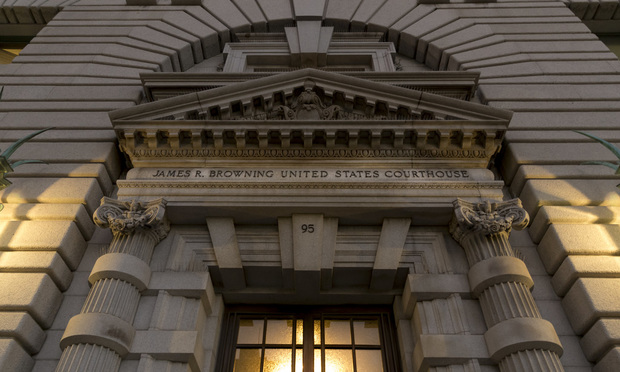Ninth Circuit Questions Trump's Asylum Changes—And the Nationwide Injunction Blocking Them
The court heard arguments in the administration's appeal of a nationwide injunction of the so-called "third country" asylum rule—changes that bar asylum for those who didn't apply for protection in a country they transited through to reach the U.S.
December 02, 2019 at 03:54 PM
4 minute read
 U.S. Court of Appeal for the Ninth Circuit in San Francisco. Photo: Jason Doiy/ALM
U.S. Court of Appeal for the Ninth Circuit in San Francisco. Photo: Jason Doiy/ALM
Federal appellate judges considering a legal challenge to the so-called "third country" asylum rule—Trump Administration rule changes that bar asylum for migrants who fail to apply for protection in a country they transit through to reach the U.S.—raised concerns about the lack of evidence that asylum seekers would be safe in applying for asylum in venues such as Mexico or Guatemala.
But the three-judge panel of the U.S. Court of Appeals for the Ninth Circuit, hearing arguments Monday over an injunction barring the rule's implementation, likewise raised concerns about the nationwide scope of the injunction issued earlier this year by U.S. District Judge Jon Tigar of the Northern District of California.
The appellate court considered Tigar's injunction blocking enforcement of the rule that Administration lawyers contend is directed at stemming the tide of Central American migrants coming to the country through Mexico. Justice Department lawyer Scott Stewart, representing the administration Monday, called the rule a "critical" executive branch effort to deal with "unconstrained mass migration" at the nation's southern border. The nation's asylum system, he said, puts a high level of discretion with the Attorney General to make the final call on when asylum should be granted, and the rule was aimed at weeding out those immigrants with less urgent claims.
But Judge Eric Miller of the U.S. Court of Appeals for the Ninth Circuit questioned whether issuing a categorical rule barring people who passed through Mexico without applying for asylum there had effectively rendered some asylum seekers with valid claims ineligible. "Where did you address the concern that Mexico is not really a safe place for people to apply?" asked Miller, a nominee of President Donald Trump who was confirmed to the Ninth Circuit earlier this year.
Justice Department lawyer Stewart pointed to the language of the rule itself, which led to further questioning later from Judge Richard Clifton of the U.S. Court of Appeals for the Ninth Circuit, who noted the rule didn't speak to the safety of the asylum seekers. Stewart told Clifton that safety is "not the primary point of the rule."
"It's the primary point of asylum," Clifton responded.
Still, Clifton and his colleagues questioned the nationwide scope of Tigar's injunction. Clifton called the nationwide damages claimed by the immigration advocacy organizations represented by the American Civil Liberties Union who are plaintiffs in the case "a thin soup," especially those related to training lawyers to handle asylum cases outside the Ninth Circuit.
In the district court below, Tigar issued a nationwide injunction in July finding that the rule was "inconsistent with the existing asylum laws" passed by Congress. After the Ninth Circuit earlier limited the injunction to the boundaries of the circuit, Tigar again extended it nationwide in September.
The U.S. Supreme Court later that month temporarily lifted the injunction and allowed the third-country asylum rule to go into place pending the outcome of the government's Ninth Circuit appeal or Supreme Court review, if a petition is filed following any forthcoming Ninth Circuit decision. The high court granted the government's request for a stay without explanation. Justices Ruth Bader Ginsburg and Sonia Sotomayor dissented, with Sotomayor writing that "although the stakes for asylum seekers could not be higher—the Government implemented its rule without first providing the public notice and inviting the public input generally required by law."
At the argument Monday, Clifton noted that the posture of the case illustrated that nationwide injunctions could be a "two-edged sword." Even if the court were to side with the plaintiffs, he noted, its ruling wouldn't even affect the Ninth Circuit until the Supreme Court weighs in.
Read more:
Supreme Court Won't Block Trump's New Asylum Rule, for Now
Judge Tigar Doubles Down on National Injunction for Trump's Latest Asylum Rule
9th Circuit Panel Fractures Over National Injunctions With Trump's Latest Asylum Order
A Fair Day in Court Starts With an Independent Immigration Court System
This content has been archived. It is available through our partners, LexisNexis® and Bloomberg Law.
To view this content, please continue to their sites.
Not a Lexis Subscriber?
Subscribe Now
Not a Bloomberg Law Subscriber?
Subscribe Now
NOT FOR REPRINT
© 2025 ALM Global, LLC, All Rights Reserved. Request academic re-use from www.copyright.com. All other uses, submit a request to [email protected]. For more information visit Asset & Logo Licensing.
You Might Like
View All
White & Case KOs Claims Against Voltage LLC in Solar Companies' Trade Dispute

Goodwin Procter Relocates to Renewable-Powered Office in San Francisco’s Financial District

Polsinelli Picks Up Corporate Health Care Partner From Greenberg Traurig in LA

Perkins Coie Lures Former Longtime Wilson Sonsini Tech Transactions Partner
Trending Stories
- 1'Ridiculously Busy': Several Law Firms Position Themselves as Go-To Experts on Trump’s Executive Orders
- 2States Reach New $7.4B Opioid Deal With Purdue After SCOTUS Ruling
- 3$975,000 Settlement Reached After Fall on Sidewalk
- 4'Where Were the Lawyers?' Judge Blocks Trump's Birthright Citizenship Order
- 5Big Law Sidelined as Asian IPOs in New York Are Dominated by Small Cap Listings
Who Got The Work
J. Brugh Lower of Gibbons has entered an appearance for industrial equipment supplier Devco Corporation in a pending trademark infringement lawsuit. The suit, accusing the defendant of selling knock-off Graco products, was filed Dec. 18 in New Jersey District Court by Rivkin Radler on behalf of Graco Inc. and Graco Minnesota. The case, assigned to U.S. District Judge Zahid N. Quraishi, is 3:24-cv-11294, Graco Inc. et al v. Devco Corporation.
Who Got The Work
Rebecca Maller-Stein and Kent A. Yalowitz of Arnold & Porter Kaye Scholer have entered their appearances for Hanaco Venture Capital and its executives, Lior Prosor and David Frankel, in a pending securities lawsuit. The action, filed on Dec. 24 in New York Southern District Court by Zell, Aron & Co. on behalf of Goldeneye Advisors, accuses the defendants of negligently and fraudulently managing the plaintiff's $1 million investment. The case, assigned to U.S. District Judge Vernon S. Broderick, is 1:24-cv-09918, Goldeneye Advisors, LLC v. Hanaco Venture Capital, Ltd. et al.
Who Got The Work
Attorneys from A&O Shearman has stepped in as defense counsel for Toronto-Dominion Bank and other defendants in a pending securities class action. The suit, filed Dec. 11 in New York Southern District Court by Bleichmar Fonti & Auld, accuses the defendants of concealing the bank's 'pervasive' deficiencies in regards to its compliance with the Bank Secrecy Act and the quality of its anti-money laundering controls. The case, assigned to U.S. District Judge Arun Subramanian, is 1:24-cv-09445, Gonzalez v. The Toronto-Dominion Bank et al.
Who Got The Work
Crown Castle International, a Pennsylvania company providing shared communications infrastructure, has turned to Luke D. Wolf of Gordon Rees Scully Mansukhani to fend off a pending breach-of-contract lawsuit. The court action, filed Nov. 25 in Michigan Eastern District Court by Hooper Hathaway PC on behalf of The Town Residences LLC, accuses Crown Castle of failing to transfer approximately $30,000 in utility payments from T-Mobile in breach of a roof-top lease and assignment agreement. The case, assigned to U.S. District Judge Susan K. Declercq, is 2:24-cv-13131, The Town Residences LLC v. T-Mobile US, Inc. et al.
Who Got The Work
Wilfred P. Coronato and Daniel M. Schwartz of McCarter & English have stepped in as defense counsel to Electrolux Home Products Inc. in a pending product liability lawsuit. The court action, filed Nov. 26 in New York Eastern District Court by Poulos Lopiccolo PC and Nagel Rice LLP on behalf of David Stern, alleges that the defendant's refrigerators’ drawers and shelving repeatedly break and fall apart within months after purchase. The case, assigned to U.S. District Judge Joan M. Azrack, is 2:24-cv-08204, Stern v. Electrolux Home Products, Inc.
Featured Firms
Law Offices of Gary Martin Hays & Associates, P.C.
(470) 294-1674
Law Offices of Mark E. Salomone
(857) 444-6468
Smith & Hassler
(713) 739-1250






